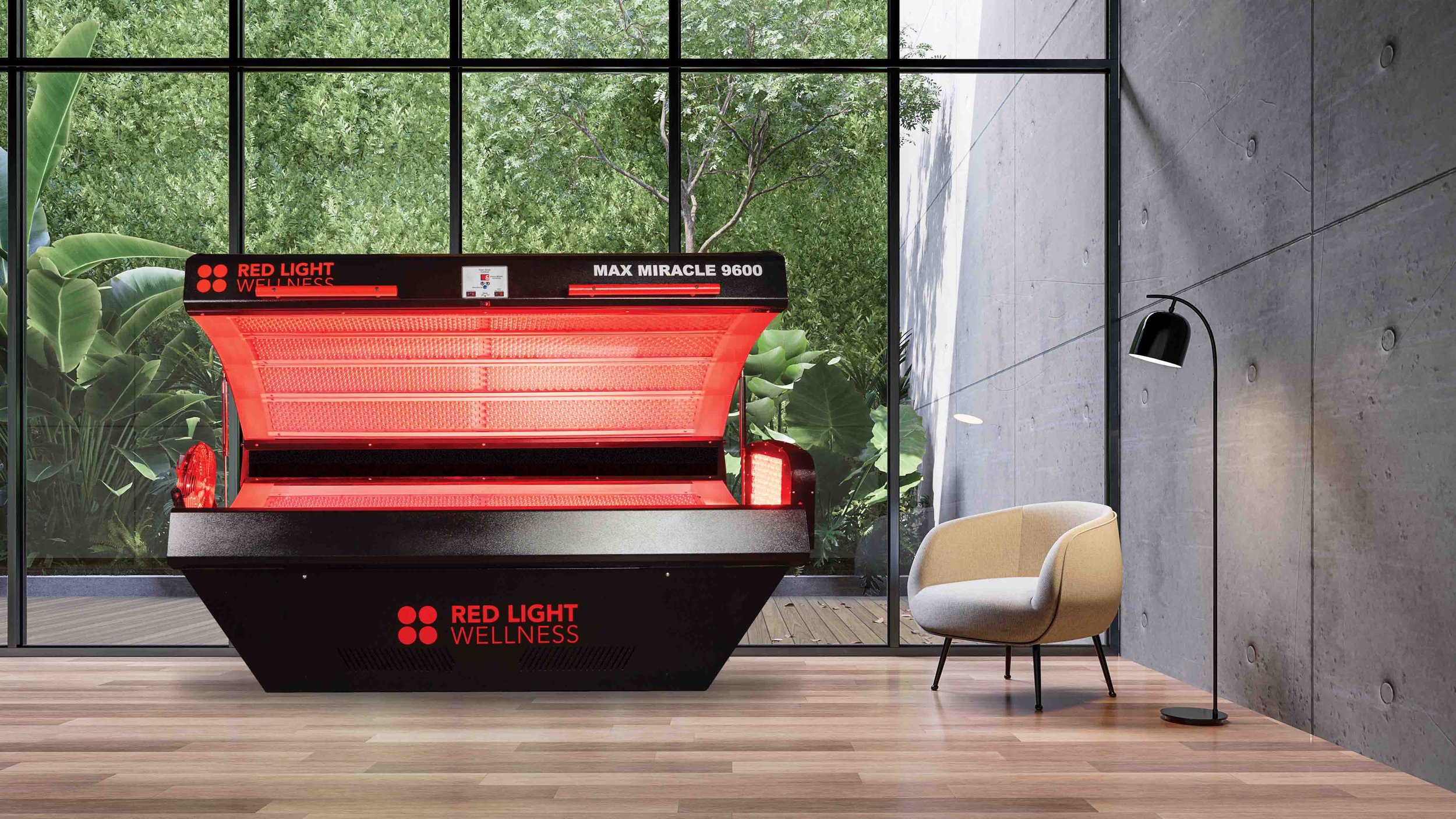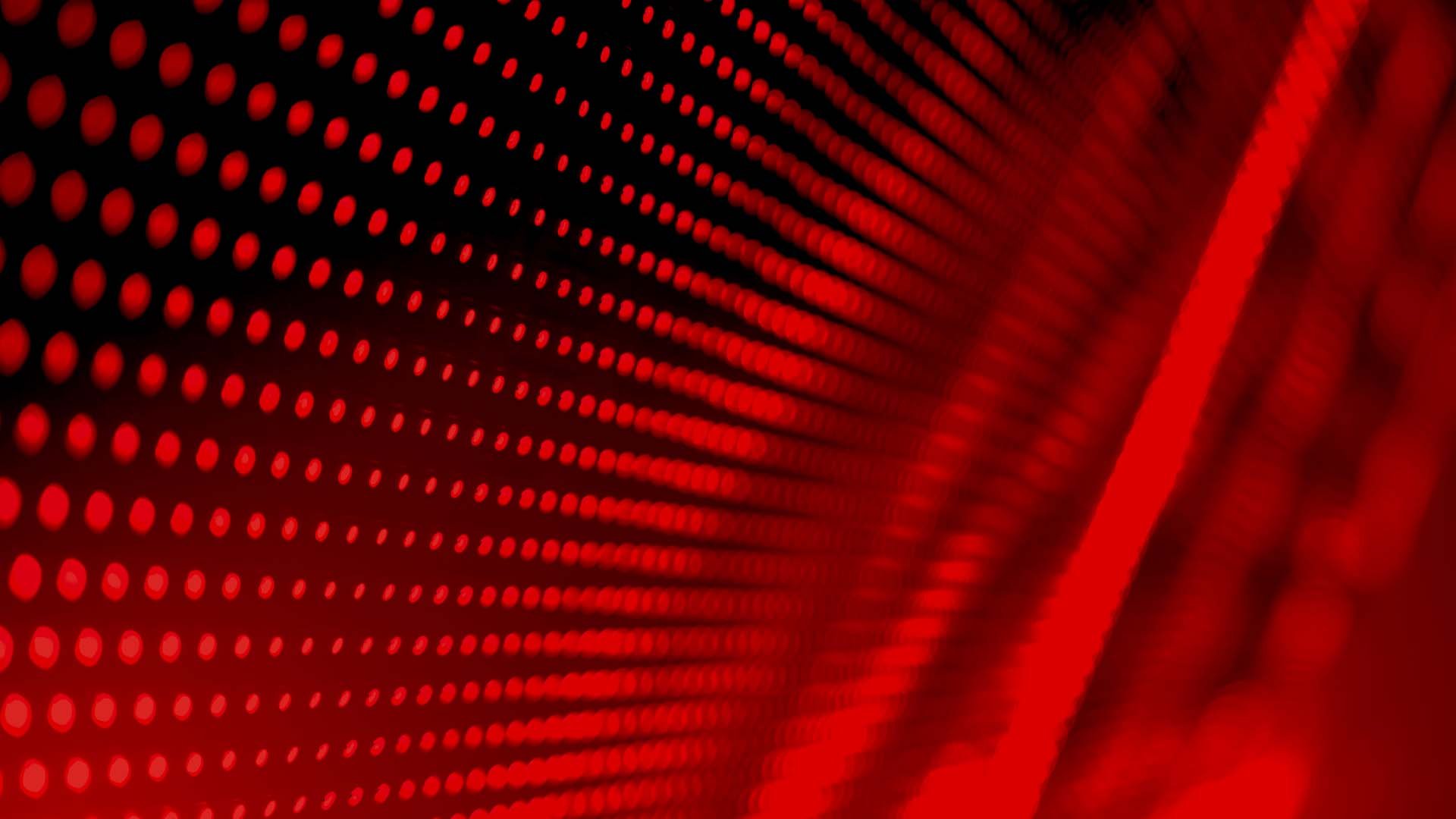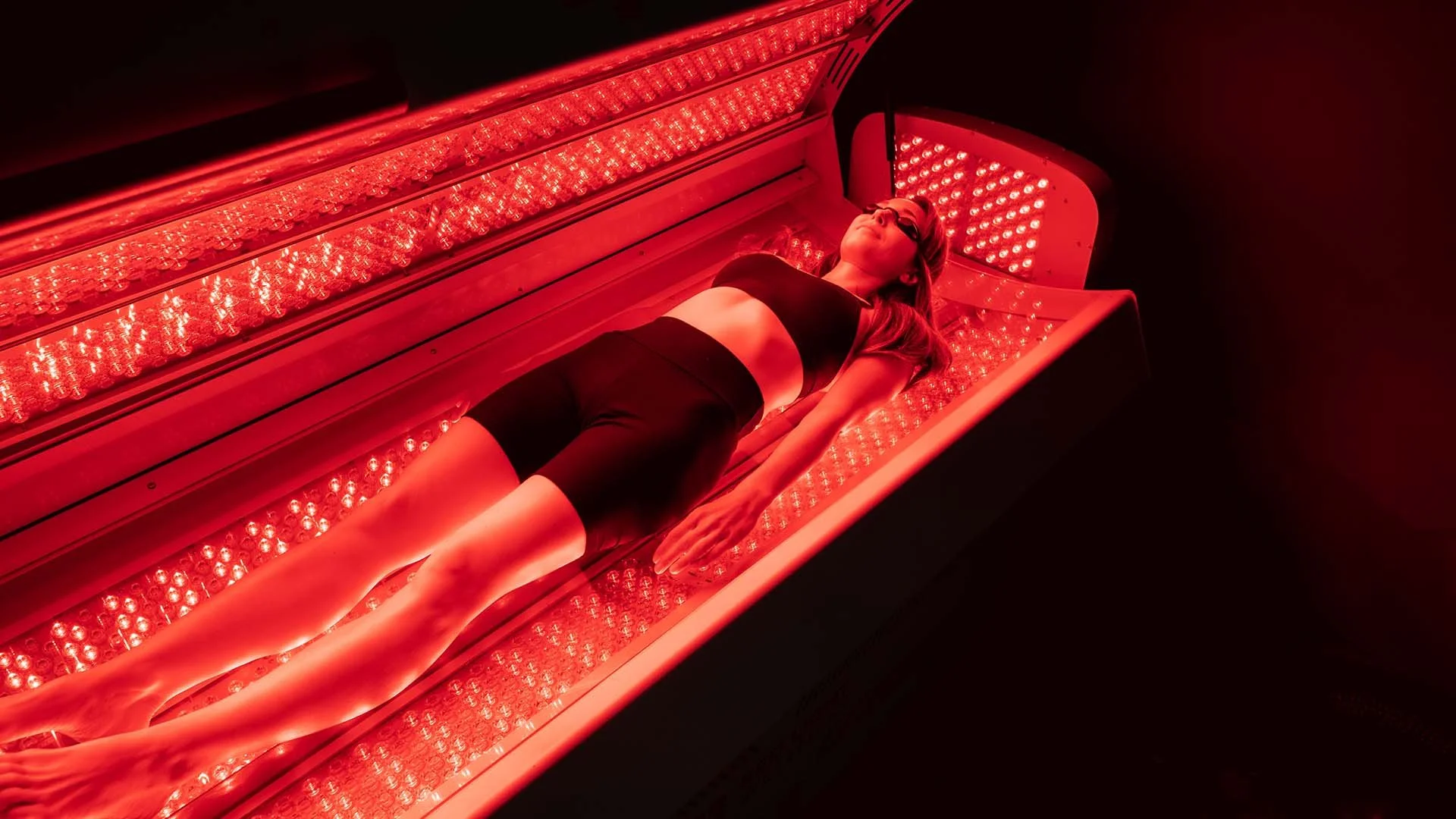Red Light Therapy Bed
Red Light Wellness offers a suite of full-body photobiomodulation devices for clinics, medical spas, doctors’ offices, gyms, and any other location where health services are provided. It delivers 625 - 670nm / 830 - 910nm with high irradiance for predictable outcomes. Compare models, see pricing ranges, and get a tailored quote with delivery, setup, and training.
625-670nm / 830-910nm wavelengths with high irradiance
FDA Class II built to FDA safety standards with high-quality components
Financing Available and fast installation
Typical breakeven in 6–12 months at five sessions/day.* ROI Calculator
The Wellness Collection
Medical-Grade Red Light Therapy Beds
-

Max Miracle 9600
Irradiance: ~960 mW/cm² (≈ 196 J/cm² in 10 min)
Electrical:50 A circuit
Warranty: 10-yr frame / 2-yr components
Financing available
-

Big Miracle 7200
Irradiance: ~720 mW/cm² (≈ 147 J/cm² in 10 min)
Electrical:40 A circuit
Warranty: 10-yr frame / 2-yr components
Financing available
-

The Miracle 6200
Irradiance: ~600 mW/cm² (≈ 123 J/cm² in 10 min)
Electrical:30 A circuit
Warranty: 10-yr frame / 2-yr components
Financing available
-

The Miracle 5040
Irradiance: ~504 mW/cm² (≈ 103 J/cm² in 10 min)
Electrical:30 A circuit
Warranty: 10-yr frame / 2-yr components
Financing available
Pricing & ROI
Red light therapy bed pricing is straightforward and built to deliver fast payback for clinics. You’ll see investment ranges by model when you request a quote; what determines your price are the options you choose and your install needs.
What drives price
Model and configuration (power, enclosure, finishes)
Delivery, placement, and electrical requirements
Warranty coverage and service level
Optional training, marketing, and accessories
What drives ROI
Session fee and memberships (single, package, subscription)
Sessions per day (shorter sessions → more daily slots)
Days open per month and staff workflow
Cross-sell add-ons (cryotherapy, IV, PEMF, skincare)
Simple math you control
Monthly revenue = sessions/day × fee × days/month
Breakeven (months) = investment ÷ monthly revenue
Typical fee guidance
Most clinics price full-body sessions in a $50–$150 range, with higher fees for bundles, memberships, or combo services. Pick a fee that matches your market and your brand.
Return On Investment (ROI) Calculator
Red Light Wellness for Professionals offers cutting-edge red light therapy solutions for commercial applications. Calculate your potential return on investment with our products below.
Note: Device sale prices are automatically included in the calculations.
Calculating your ROI...
Results
Year One ROI Multiple and Percentage (Revenue/Cost)
Specs & Compliance
Red light therapy bed buyers compare on three things: power and dose (speed), electrical (feasibility), and certified safety (risk). Use this section to answer those in one glance. Full dimensions and compliance notes live here so the model cards can stay fast and scannable.
What’s covered here
Irradiance (mW/cm²) & delivered dose (J/cm² in 10 min) — ties power to session length
Electrical requirements — volts/amps and dedicated circuit guidance
Dimensions & weight — footprint planning and delivery logistics
Wavelengths — red and near-infrared bands used
Compliance & safety — FDA/Class, IEC 60601/62471, UL/CE (as applicable)
Warranty — frame and component coverage
Red Light Wellness Bed Comparison Table
| Feature | Max Miracle 9600 | Big Miracle 7200 | The Miracle 6200 | The Miracle 5040 |
|---|---|---|---|---|
| LED Count | 3,200 | 2,400 | 2,000 | 2,553 |
| Irradiance | 960 mW/cm² | 720 mW/cm² | 620 mW/cm² | 504 mW/cm² |
| Energy Output (10 min) | 196.48 J/cm² | 147 J/cm² | 123 J/cm² | 103 J/cm² |
| Wavelengths | 625–670nm / 830–910nm | 625–670nm / 830–910nm | 625–670nm / 830–910nm | 625–670nm / 830–910nm |
| Treatment Time | 8–15 minutes | 8–15 minutes | 8–15 minutes | 8–15 minutes |
| Head and Foot LED Therapy | Included | Included | Included | Included |
| Electrical Requirement | 50 AMP | 40 AMP | 30 AMP | 30 AMP |
| Weight | 950 lbs | 750 lbs | 700 lbs | 650 lbs |
| Weight Capacity | 450 lbs | 450 lbs | 450 lbs | 450 lbs |
| Dimensions (L × W × H) | 93″ × 44″ × 58″ | 93″ × 38″ × 55″ | 93″ × 37.5″ × 51″ | 93″ × 37.5″ × 51″ |
| FDA Registered Device | Class II | Class II | Class II | Class II |
| Warranty | 10-year frame / 2-year components | Same | Same | Same |
| Country of Manufacture | United States | United States | United States | United States |
Compliance notes
Devices are non-thermal photobiomodulation systems. Models use visible red (~660 nm) and near-infrared (~850 nm) light. Clinical safety and labeling comply with applicable standards (e.g., FDA Class II, IEC 60601/62471, UL/CE). Always verify model-specific certifications and indications on your quote.
Planning & install guidance
Allow clearance for doorways, placement, and ventilation.
Confirm available amperage and breaker type before delivery.
Provide a dedicated circuit when specified; avoid extension runs.
We provide a pre-delivery checklist, assembly, and staff training.
Room Layout & Power
A red light therapy bed is easy to place when you plan for clearance, power, and delivery path.
Here is a helpful guide to confirm feasibility before you request pricing.
What matters most
Clearance & ergonomics: keep space for the door to open fully, for the client to enter/exit, and for staff to move around the bed without strain.
Electrical capacity: confirm the right voltage & amperage on a dedicated circuit per model.
Delivery path: check door widths, hallways, turns, elevators, and landing areas for the bed’s largest dimension and weight.
Ventilation & heat management: standard HVAC is usually sufficient; avoid tight enclosures and allow air flow around the unit.
Flooring & load: ensure level flooring and adequate load tolerance; protect thresholds and corners during placement.
Comfort & privacy: dimmable lighting, sound attenuation, and optional privacy screens improve the experience.
Electrical requirements (by model)
Max Miracle 9600 — 220V, 50A dedicated circuit
Big Miracle 7200 — 220V, 40A dedicated circuit
Miracle 6200 — 220V, 30A dedicated circuit
Miracle 5040 — 220V, 30A dedicated circuit
(We’ll confirm breaker type and outlet specifics on your quote.)
Quick room planning guidelines
Clearance targets: plan 24–36 in (61–91 cm) of working clearance on at least one side and at the head/foot for staff movement and service access.
Doorways: aim for 36 in (91 cm) or wider door openings on the delivery path; measure tight corners and stair turns.
Ceiling height: verify height clearance above the tallest point of the unit plus a small buffer for ventilation and cabling.
Noise/heat: place away from treatment areas that require absolute quiet; light fan noise and warmth are typical.
Delivery path checklist
Measure every doorway, corridor, and turn from the building entrance to the treatment room.
Confirm elevator weight rating (if applicable) against the unit’s shipping/installed weight.
Protect floors, bannisters, and corners on delivery day.
Reserve staging space near the treatment room for unpacking and assembly.
Room Layout & Power
Check dimensions, electrical & safety
See Full Specs & Compliance for dimensions, weight, wavelengths, certifications, warranty.
Use Irradiance & dose (J/cm² in 10 min) to choose the model that meets your session-length targets.
Next step (make it easy)
Get pricing & a room/power check
We’ll verify amperage, breaker type, and delivery path and send a model-specific spec sheet.
Review Full Specs & Compliance
Outcomes & Testimonials
Red light therapy beds are delivering predictable results for clinics that need fast sessions, steady throughput, and low-friction installs.
Outcomes at a glance
Shorter sessions: typical full-body visits run 8–15 minutes, enabling more daily slots without adding staff.
Revenue fit: clinics commonly price sessions in the $50–$150 range; memberships drive utilization.
Feasible installs: dedicated 30–50A circuits by model; room planning is straightforward with standard clearance.
Results vary by market, pricing, and workflow.
Featured clients (watch their stories)
Dr. Jeremy Landry — Laser Like Lipo (Kansas City)
Fat-loss results highlighted on the Max Miracle 9600, with inch-loss reported per session and a spa-like experience.
Jenny Siepka — Valley Cryo (Charlottesville, VA)
Why she graduated from pads to a whole-body system and what changed in outcomes and workflow.
Dr. Howard Goodman — Long Island Weight Loss (with patient story)
A weight-loss journey that mentions skin tightening and feeling better, alongside diet and red light sessions.
Ian Clark — Owner perspective
Why he calls it the easiest bed to operate on the market.
Russell George — Parkinson’s narrative
Personal account of symptom changes over time with regular sessions.
Tammy — Back pain; Kenton — Brain health
Individual experiences with comfort, sleep, and energy noted.
Watch our video testimonials here
Testimonials reflect individual experiences and are not claims of treatment, cure, or typical results. Always consult a clinician for medical advice.
Science (PBM) & Benefits
Red light therapy bed is a full-body photobiomodulation (PBM) system that delivers red (~660 nm) and near-infrared (~850 nm) light at high irradiance so tissues reach a therapeutic dose in minutes.
Mechanism: how PBM works
Red light therapy bed increases mitochondrial activity. Photons interact with cytochrome c oxidase, boost ATP, modulate nitric oxide, and trigger low-level ROS that nudge Nrf2/NF-κB signaling toward repair and anti-inflammatory balance.
Learn more
Wavelengths: 660 nm + 850 nm
Red light therapy bed uses dual bands for coverage. ~660 nm targets superficial and microvascular layers; ~850 nm penetrates deeper muscle and peripheral nerve tissue. Together they support surface and sub-surface goals.
Learn more
Dose: irradiance × time = fluence
Red light therapy bed turns power into predictable dose. Dose (J/cm²) equals irradiance (mW/cm²) times time (minutes). Higher irradiance shortens sessions while holding dose constant—why typical full-body sessions run 8–15 minutes.
Learn more
Benefits clinics pursue
Red light therapy bed supports pragmatic goals: recovery & performance (less soreness, faster readiness), adjunct relief for joint/soft-tissue discomfort, skin appearance (tone/texture), microcirculatory support via NO, and commonly reported sleep/mood/energy improvements. Outcomes vary by protocol and individual.
Learn more
Cadence & protocols
Red light therapy bed session planning is simple: 8–15 minutes, 2–4×/week initially, then taper to maintenance. Map session length to your model’s irradiance and your target dose; keep protocols clinician-directed.
Learn more
Safety & contraindications
Red light therapy bed is non-thermal and non-ionizing. Use eye protection; screen for photosensitizing drugs, pregnancy, active cancer treatment unless clinician-directed, and heat-sensitive conditions. Follow device labeling and your clinic’s SOP.
Learn more
Safety Profile and Clinical Considerations
Established Safety Record
Red light therapy has an exceptional safety profile with minimal side effects when used according to established protocols. Decades of clinical research demonstrate its non-invasive, non-thermal nature.
Safety Features in Professional Red Light Therapy Beds
Eye Protection Protocols
UV-free wavelengths: No harmful ultraviolet radiation
Protective eyewear: Required during treatment sessions
Automatic shutoff: Prevents overexposure
Thermal Safety
Non-thermal photobiomodulation: No tissue heating effects
Temperature monitoring: Prevents excessive heat buildup
Cooling systems: Maintain optimal operating temperatures
Electrical Safety
FDA-registered components: Medical-grade electrical safety standards
Ground fault protection: Prevents electrical hazards
Emergency shutoff: Immediate treatment termination capability
Contraindications and Precautions
Absolute Contraindications
Active cancer in treatment area (consult oncologist)
Pregnancy (treatment over abdomen/pelvis)
Severe photosensitivity disorders
Relative Contraindications (Require Medical Consultation)
Photosensitizing medications
Recent steroid injections in treatment area
Active infections or fever
Implanted electronic devices (pacemakers, etc.)
Treatment Best Practices
Pre-treatment: Remove makeup, lotions, and jewelry
Hydration: Adequate water intake before and after sessions
Documentation: Treatment logs for progress monitoring
Medical consultation: Always advised for underlying health conditions
Ready to explore professional-grade red light therapy beds that meet these safety standards?
Professional Healthcare Applications
| Healthcare Specialty | Primary Uses | Treatment Integration | Patient Benefits | Typical Protocols |
|---|---|---|---|---|
| Chiropractic Medicine | Pain management, inflammation reduction, tissue healing | Pre/post-adjustment therapy, chronic pain protocols | Enhanced treatment outcomes, reduced recovery time | 2-3 sessions per week, combined with manual therapy |
| Physical Therapy and Rehabilitation | Muscle recovery, joint mobility, post-injury healing | Part of comprehensive rehabilitation programs | Accelerated healing, improved function, pain relief | Daily sessions during acute phase, maintenance thereafter |
| Functional and Integrative Medicine | Systemic wellness, mitochondrial support, anti-aging | Holistic health optimization programs | Enhanced cellular function, improved energy, overall wellness | Regular maintenance sessions, personalized frequency |
| Aesthetic and Medical Spas | Skin rejuvenation, anti-aging, post-procedure healing | Standalone treatments or combined with other modalities | Improved skin quality, reduced signs of aging | Weekly sessions for aesthetic goals, intensive for specific concerns |
| Sports Medicine and Athletic Performance | Performance enhancement, injury prevention, recovery acceleration | Pre/post-training protocols, injury rehabilitation | Faster recovery, improved performance, injury prevention | Daily use during training, intensive during recovery phases |
Red Light Beds vs Other Light Therapy Devices: Understanding the Differences
Treatment Coverage and Efficiency Red Light Therapy Beds: Provide full-body 360-degree coverage in a single session, ensuring uniform light distribution across all treatment areas.
Light Panels: Require multiple positioning changes to treat the entire body, leading to uneven coverage and longer treatment times.
Handheld Devices: Limited to small treatment areas, requiring numerous sessions to achieve comprehensive coverage.
Professional vs Consumer Applications: Red light therapy beds are engineered for clinical environments with medical-grade components, consistent power output, and safety features required for professional healthcare settings.
Consumer devices typically offer lower power density and lack the durability needed for high-volume clinical use.
Shopping for red light therapy full-body equipment?
Fill out the form to get a quote today
Red Light Bed Frequently Asked Questions
-
A full-body device that uses LED light to stimulate natural healing and rejuvenation.
-
3–5 sessions per week depending on the condition and protocol.
-
Yes. Our beds are made with FDA-registered components and come with protective eyewear and built-in safety features.
-
Red light beds use non-thermal, non-UV wavelengths designed for healing, not sweating or tanning.
-
Panels treat small areas and require repositioning. Our beds offer full-body, hands-free sessions at higher power levels and better consistency.
-
Clients typically experience reduced pain, faster recovery, better sleep, and improved skin within 3–6 weeks of consistent use.
-
Yes — we offer flexible financing options to make integration seamless for new and established businesses.
-
What is the difference between red and near-infrared light?
Red light targets skin-level repair (620–660nm), while near-infrared penetrates deeper (800–850nm) into muscles, joints, and organs.
-
Yes. FDA Class II clearance means the device meets rigorous standards for non-invasive therapeutic application.
-
10–20 minutes depending on target condition, watt density, and device specs.
-
Our light therapy bed technology delivers the highest therapeutic irradiance in the industry, enabling faster treatment times and better patient outcomes than any competitor.





















